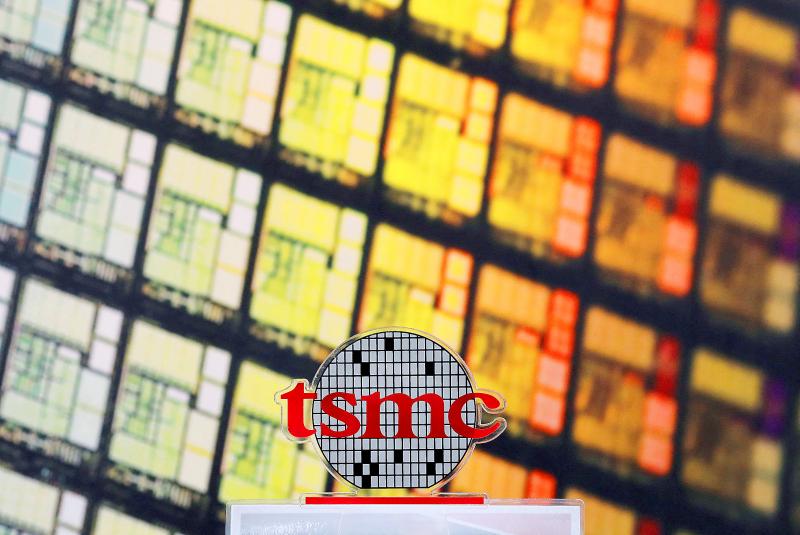Taiwan Semiconductor Manufacturing Co (TSMC, 台積電) executives on Thursday said that it would obtain the next version of ASML Holding NV’s most advanced chipmaking tool in 2024.
The tool — called “high-NA EUV” — produces beams of focused light that create the microscopic circuitry on computer chips used in phones, laptops, vehicles and artificial intelligence devices, such as smart speakers.
EUV stands for extreme ultraviolet, the wavelength of light used by ASML’s most advanced machines.

Photo: Tyrone Siu, Reuters
“TSMC will bring in high-NA EUV scanners in 2024 to develop the associated infrastructure and patterning solution needed for customers to fuel innovation,” TSMC senior vice president of research and development Y.J. Mii (米玉傑) said at the company’s technology symposium in Silicon Valley.
MASS PRODUCTION
Mii did not say when the device, the second generation of extreme ultraviolet lithography tools for making smaller and faster chips, would be used for mass production.
TSMC rival Intel Corp has said it would use the machines in production by 2025 and that it would be the first to receive the machine.
As Intel enters the business of making chips that other companies design, it would be competing with TSMC for those customers.
TSMC senior vice president of business development Kevin Zhang (張曉強) clarified that TSMC would not be ready for production with the new high-NA EUV tool in 2024, but that it would be used mostly for research with partners.
“The importance of TSMC having it in 2024 means they get to the most advanced technology faster,” said TechInsights chip economist Dan Hutcheson, who was at the symposium.
“High-NA EUV is the next major innovation in the technology that will put the chip technology at the lead,” Hutcheson said.
NANOSHEET
TSMC also gave more details on the technology for its 2-nanometer chips, which it said are on track for volume production in 2025.
TSMC said it has spent 15 years developing so-called “nanosheet” transistor technology to improve speed and power efficiency, and will use it for the first time in its 2-nanometer chips.

Semiconductor shares in China surged yesterday after Reuters reported the US had ordered chipmaking giant Taiwan Semiconductor Manufacturing Co (TSMC, 台積電) to halt shipments of advanced chips to Chinese customers, which investors believe could accelerate Beijing’s self-reliance efforts. TSMC yesterday started to suspend shipments of certain sophisticated chips to some Chinese clients after receiving a letter from the US Department of Commerce imposing export restrictions on those products, Reuters reported on Sunday, citing an unnamed source. The US imposed export restrictions on TSMC’s 7-nanometer or more advanced designs, Reuters reported. Investors figured that would encourage authorities to support China’s industry and bought shares

FLEXIBLE: Taiwan can develop its own ground station equipment, and has highly competitive manufacturers and suppliers with diversified production, the MOEA said The Ministry of Economic Affairs (MOEA) yesterday disputed reports that suppliers to US-based Space Exploration Technologies Corp (SpaceX) had been asked to move production out of Taiwan. Reuters had reported on Tuesday last week that Elon Musk-owned SpaceX had asked their manufacturers to produce outside of Taiwan given geopolitical risks and that at least one Taiwanese supplier had been pushed to relocate production to Vietnam. SpaceX’s requests place a renewed focus on the contentious relationship Musk has had with Taiwan, especially after he said last year that Taiwan is an “integral part” of China, sparking sharp criticism from Taiwanese authorities. The ministry said

US President Joe Biden’s administration is racing to complete CHIPS and Science Act agreements with companies such as Intel Corp and Samsung Electronics Co, aiming to shore up one of its signature initiatives before US president-elect Donald Trump enters the White House. The US Department of Commerce has allocated more than 90 percent of the US$39 billion in grants under the act, a landmark law enacted in 2022 designed to rebuild the domestic chip industry. However, the agency has only announced one binding agreement so far. The next two months would prove critical for more than 20 companies still in the process

CHANGING JAPAN: Nvidia-powered AI services over cellular networks ‘will result in an artificial intelligence grid that runs across Japan,’ Nvidia’s Jensen Huang said Softbank Group Corp would be the first to build a supercomputer with chips using Nvidia Corp’s new Blackwell design, a demonstration of the Japanese company’s ambitions to catch up on artificial intelligence (AI). The group’s telecom unit, Softbank Corp, plans to build Japan’s most powerful AI supercomputer to support local services, it said. That computer would be based on Nvidia’s DGX B200 product, which combines computer processors with so-called AI accelerator chips. A follow-up effort will feature Grace Blackwell, a more advanced version, the company said. The announcement indicates that Softbank Group, which until early 2019 owned 4.9 percent of Nvidia, has secured a